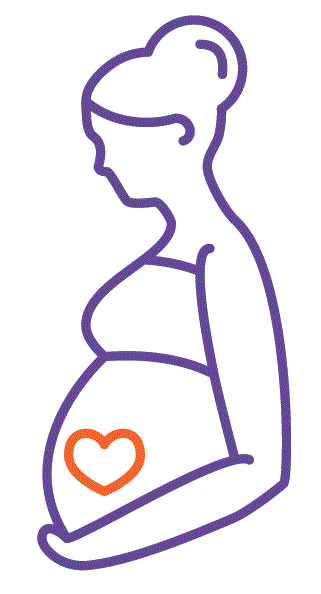Applying Self-Management to Your Daily Life
Lifestyle management and family planning
When you are living with lupus or lupus nephritis, healthy lifestyle choices have a big impact on how well you manage your disease. People may have jobs and financial responsibilities to manage, children or family members to take care of, personal relationships and social obligations to cope with, or other life matters that can cause high levels of stress.
Family planning and reproductive health
Lupus and lupus nephritis can negatively affect a person’s reproductive health. Reproductive health may include safe contraception use, fertility issues, or safe medication use during pregnancy or breastfeeding. This shows the need to discuss reproductive health with your doctor.
We often discuss female reproductive health when discussing lupus nephritis, but the challenges can affect men, too. Some medications used to treat lupus nephritis may affect fertility (the ability to conceive a baby), can cause significant birth defects, and can affect the health of the mother and baby during pregnancy.
Safety is first and foremost
Before you start planning to have a child, you should talk to your doctor about reproductive health.
They can advise you about:
- The best time to start planning a family.
- Actions you should take before trying to conceive a baby.
- The ways that lupus nephritis and birth control medications can affect your reproductive health.
- How lupus and lupus nephritis can affect the health of mother and baby during pregnancy.
- The effect pregnancy can have on lupus and lupus nephritis.

Lupus and lupus nephritis is commonly diagnosed in women of child-bearing age (15-44). So, it is common for a life-changing diagnosis to occur when a woman is deciding if it is time to have her first child or have more children. Having lupus nephritis does not mean you will be unable to have children, but it does mean that pregnancy requires careful planning. Talking to your doctor can increase the likelihood of having a healthy pregnancy. Precise timing of pregnancy and selection of medication is critical and using your self-management skills can be helpful.
Go to the Communicating with your healthcare team section to get tips that can help you have this discussion with your doctor.
Self-management goal setting for lifestyle management
Here are five goals for lifestyle management you can set and work toward:
- Make healthy food choices.
- Eating healthy foods and decreasing salt/sodium intake can reduce some physical symptoms of lupus or lupus nephritis and help to protect your kidneys.
- Do what you can to reduce stress.
- Take time to find ways to relax. It can be as simple as talking a walk, listening to music, playing a game or doing an activity that makes you laugh. Relaxation techniques such as meditation, deep breathing and guided imagery can help.
Some days may be more difficult than others when working toward your lifestyle management goals. But even small steps can make a big difference.
- Promote emotional and social wellness.
- Building healthy relationships and practicing emotional self-care improves mental and emotional wellbeing. People who have a chronic disease such as lupus and lupus nephritis may feel isolated from friends and family who do not deal with the day-to-day experiences of a chronic illness. Finding a support group can help. It is important to have a loving support system of people who will listen to you when you need to talk, encourage you when you are feeling down, or give you usef ul advice because they also deal with challenges that are similar to yours.
- Look for opportunities to be active.
- Getting regular exercise is good for the mind and the body. It promotes better physical health, improves thinking, and helps to reduce stress. While many types of exercise are beneficial, taking walks, swimming, yoga, and tai chi are options that work well.

- Avoid smoking.
- Smoking harms the body and can worsen lupus nephritis in many ways. You may need to get professional help if it is hard for you to quit on your own.
Hear from People Living with Lupus
Other Resources for Lifestyle Management
( Note: These are all external web resources )

Everyday Living with Lupus: Be Proactive
A recorded presentation with PowerPoint slides created by Jessica Rowshandel, LMSW and provided by Lupus Research Alliance to help you live with lupus including how you can create a coping toolkit (June 26, 2014).
Living With Lupus
An illustrated story that provides tips on how to live with lupus.
Coping with Chronic Illness
A recorded presentation with PowerPoint slides provided by Lupus Research Alliance and Becky Hashim, PhD (April 11, 2012).

Managing stress may help people with lupus reduce the occurrence of lupus flares and improve their overall health. Techniques that may help people manage stress include mediation, mindfulness, and Mindfulness-Based Stress Reduction (MBSR).
Mindfulness-Based Stress Reduction (MBSR) is a program developed by Dr. Jon Kabat-Zinn at the Stress Reduction Clinic at the University of Massachusetts Medical Center. This program uses mindfulness mediation to help people manage their stress and improve their health, including those who live with chronic illnesses. The University of Massachusetts Medical School’s Center for Mindfulness offers 8-week long in-person and online MBSR programs for a fee. Other organizations also offer MBSR programs and resources, and two of these organizations are listed below.
There are also a variety of apps available that can help you incorporate mindfulness mediation into your daily routine as a way to manage stress. If you and your healthcare providers think mediation or MBSR programs may help you manage your stress and your lupus related health problems, we encourage you to learn more about how stress impacts lupus and explore the many resources available online and in your community. The links included here are to help you get started in your research.
Stop, Breathe & Think: Meditation and Mindfulness
An app designed to help you practice meditation and mindfulness.
The MBSR Online Course
An 8-week, online mindfulness-based stress reduction (MBSR) program taught by Dr. Saki Santorelli and Florence Meleo-Meyer.

Diet
Information on diet considerations for people with lupus from The Johns Hopkins Lupus Center. Also included is a reference to another page, Things to Avoid, also created by The Johns Hopkins Lupus Center.

UV Exposure: What You Need To Know
Lupus Foundation of America’s National Resource Center on Lupus provides information on the dangers of UV exposure and suggest ways people with lupus can protect themselves.

Managing Lupus
Centers for Disease Control and Prevention website that contains online resources provided by the Office on Women’s Health to control lupus symptoms, prevent lupus flares, and cope with the challenges of living with lupus.

Self-Management Resource Center
SMRC provides information on both small group and online programs for chronic disease and chronic pain self-management. These programs are typically offered through an independent organization. Click here to learn if a particular program is offered by an organization in your area.
Toolkit for Active Living with Chronic Conditions
This toolkit contains all of the tools in the Chronic Disease Self-Management Program and is sent to you through the mail.
National Resource Center on Lupus
The website developed by the Lupus Foundation of America contains a collection of up-to-date resources and information on lupus.

Arthritis Foundation’s (AF) Section on Exercise
Section includes workouts and videos. Additionally, visit AF’s page on Exercise and Aquatic Programs to find local fitness related programs that they offer.
Your Exercise Solution
This tool, provided by the Arthritis Foundation, helps you find exercises and activities that are right for you based on specific injuries or pain you may be experiencing.
Most and Least Recommended Types of Yoga When You Have Lupus
Lupus Foundation of America’s National Resource Center on Lupus gives an overview of the types of yoga that might be most beneficial for people living with lupus, as well as the types of yoga to approach with caution.
Walk with Ease (WWE)
A 6-week program created by the Arthritis Foundation. Program may be offered as a community program or you can take it as a self-guided course.

Speaking of Lupus
Video created by WebMD to help you talk to friends, family, and co-workers about lupus.
Lupus Secret Language
Video created by WebMD to help you explain to friends, family and co-workers how lupus makes you feel.

Local Chapters
Lupus Foundation of America has many chapters throughout the U.S. that provide local support and resources.

Lupus: Applying for Disability
Video created by WebMD to help people with lupus apply for social security disability.

